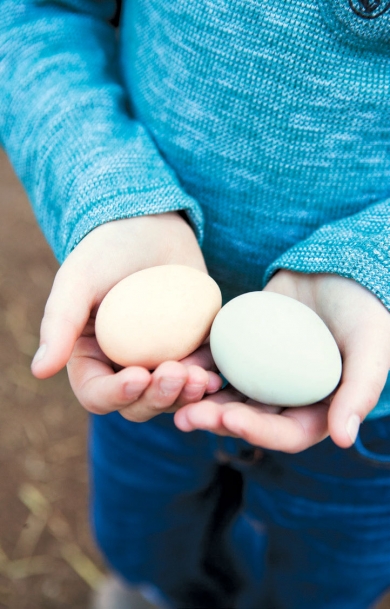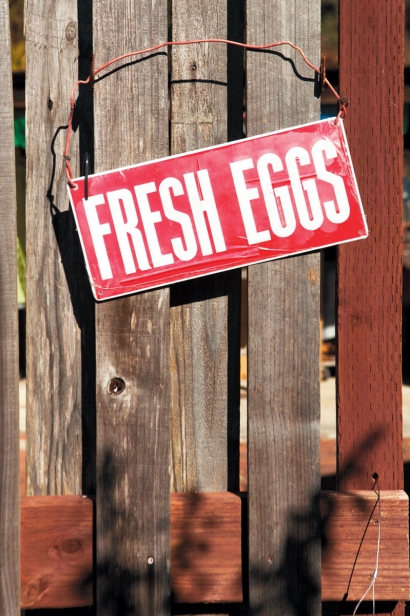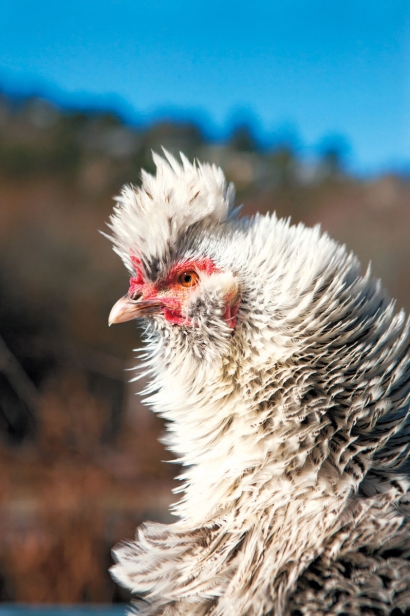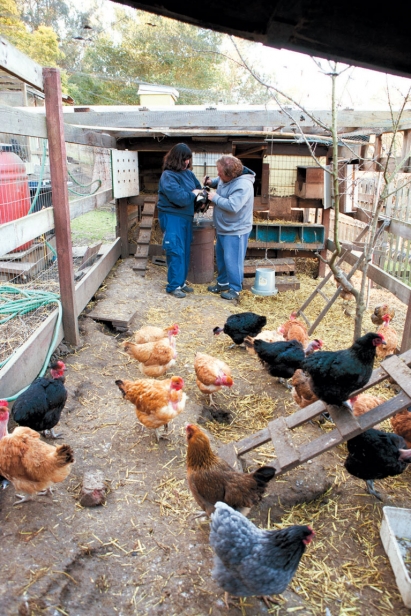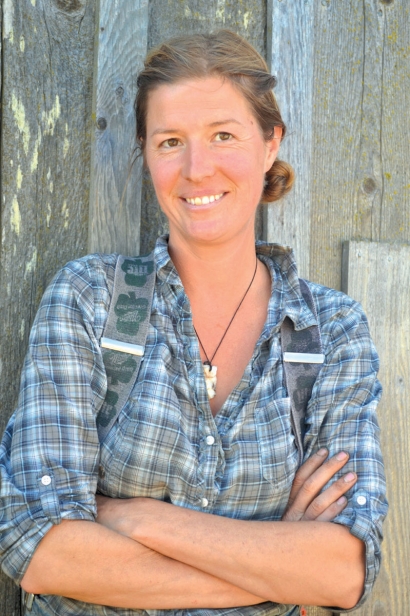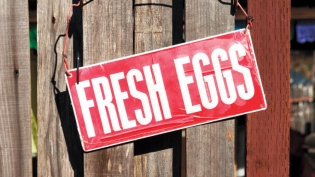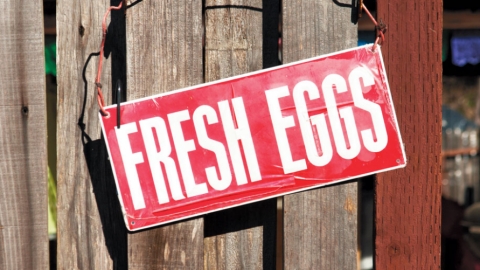Eggs First. Or Is It the Chickens?
Petaluma used to be known as “The World’s Egg Basket.” Not necessarily the chicken basket, with fries, of the world.
Many of the area’s original chicken ranching families have closed up shop. The reasons for this are personal and varied: local politics, not enough money in it, and too much competition from big growers. Most of the old chicken ranches have disappeared into vineyards, strip malls and food court complexes.
Fortunately, some of the old-timers are still around, and a new crop of young ranchers has sprung up in recent years. Public interest in antibiotic- and hormone-free, and humanely raised, poultry and eggs has made small, local producers even more attractive and popular than they were before.
THE OLD-TIMERS WHO ARE STILL CLUCKING
Among the early timers was the Shainsky family, led by Sam and Helen at their chicken ranch in Sonoma, part of the community of Jewish chicken ranchers profiled elsewhere in this issue. Back in the day, Sam gathered up other farmers’ chickens and eggs and transported them to San Francisco along with his own to help out the other guys and save travel time and expense. This enterprise turned into the now-famous Petaluma Poultry Processors, where their son, Allen Shainsky, and team developed the widely available Rocky, Rocky Jr. and Rosie chickens.
THE NEW BREED
From southern Marin County to central Sonoma County and even on the Napa side of the Carneros Region, the number of small production chicken ranchers, or farmers (some of these folks are very particular about what they call themselves), is steadily increasing. In my scouting around, I discovered a wide variety of methods being used to raise the little egg laying wonders, from the feed to the decor and ambiance of “ranches” themselves, but all of the “eggists,” a title I made up to avoid the rancher vs. farmer controversy, seem to be carrying out their work with a great deal of respect and care. Here is a window into a few of them.
WOOLLY EGG RANCH, MILL VALLEY
Woolly Egg Ranch is tucked into the foothills of Mt. Tamalpais at the southern end of Mill Valley, just a few blocks west of Highway 101, a surprising location for a farming operation by wide open spaces standards.
As you arrive at the property, on a northwest-facing slope, it looks like a dilapidated hodgepodge of buildings. It sort of is, but for a reason. Every chicken coop and shelter is built from recycled or repurposed materials they get from friendly builders and remodelers.
Judith and Ken Kirkland, the owners of Woolly Egg Farm, raise a wide variety of chickens and sheep, the former as pets and for their eggs, and the latter for meat and wool. Hence the name.
And that’s not all. Judith makes jams and preserves with fruit from trees they have planted to shade each chicken coop, and they also offer fresh berries, apples, pears, quince, plums, squash, eggplant, potatoes, honey, tomatoes and herbs.
Both Ken and Judith also work off the farm, to keep their agricultural passion going. Ken is a professional stagehand and Judith teaches Spanish at a local Marin County school. But it is obvious that their real love lies with each other and the farm, which Ken’s Portuguese grandfather, Manuel Silva, established as a dairy farm many decades ago. His mother, Kathy Kirkland, still lives in the farm’s main house, where she grew up.
Egg production at this truly natural operation varies with the seasons, and the Kirklands say that their chickens produce 70 to 80 eggs a day in the winter, and around 200 a day in the summer. They currently have around 40 to 50 customers who visit the ranch on Saturdays and Sundays to buy their eggs and welcome more—call ahead for availability. You can also find Woolly eggs at the Tam Valley Farmers’ Market on Tuesdays, or scrambled into an omelet at Shoreline Coffee Shop, both just down the road from the ranch in Tam Junction. Their eggs are also sold at the Mill Valley Market.
503 Tennessee Valley Rd., Mill Valley; 415.518.4891 or 415.388.3051
GREEN STRING FARM, PETALUMA
The creation of Fred Cline and Bobby Cannard, Green String has its own principles of sustainable growing based on holistic human nutrition, healthy soils and healthy vegetables and animals. Like many Sonoma County growers who eschew organic certification primarily because of the cost of getting certified and keeping up paperwork, Green String is not certified organic, but they farm according to organic guidelines.
Cline and his wife, Nancy, own Cline Cellars and Jacuzzi Winery located south of Sonoma, as well as the Green String Institute, which sponsors a series of interns at the farm who learn sustainable agriculture, work the land and spread “the green word” around the world.
Bobby, so called to distinguish him from his late father, Bob Cannard, has been farming sustainably for 30 years, selling vegetables for decades to Alice Waters at Chez Panisse in Berkeley. Cannard was the first person to bring sheep to the Clines’ vineyards to eat the grass and weeds and poop among the vineyards for natural fertilization. At the time, many of us nearly ran our passing cars off Highway 121, wondering how high up the vines the sheep would nosh. Then came the 3,000 sheep that now live and nibble year-round at Sonoma Raceway.
Misja Nuyttens came to Green String as an intern, and stayed. She now oversees many of aspects of the farm, including production of egg-laying chickens. Misja uses an old redwood incubator box, much like the one Canadian immigrant Lyman Bice and dentist Isaac Dias invented in the late 19th century, to incubate the eggs. “This way we know exactly where our chickens come from and what their parents have eaten.” The eggs have to be kept at 100° for 21 days, and turned three times a day.
The process also frees up the hens from having to sit on their eggs, so they can get back to making more babies.
Raising mostly Rhode Island Reds, Barred Rock and Plymouth chickens, she keeps the chicks indoors for their first year, and then rotates them out into their outdoor pasture just beyond the vegetable fields where they can hang out in the shade of “chicken trailers” and find bugs for a protein “dessert.”
Misja also spreads around Biochar (charcoal created in a low-oxygen environment) for the farm’s vegetables, as well as the chickens, and says, “The babies love it. Those who have had Biochar don’t get the digestive problems that cause some farmers to feed chickens antibiotics.” She also feeds them lots of scraps of greens from the farm and store, as well as pumpkins that chickens seem to love breaking apart and working hard to gobble.
Eggs are gathered and brought into Green String’s store daily at 11am and 2pm, and leave fast. Get there early. (For more on Green String Farm, see the Fall 2013 issue of Edible Marin & Wine Country or GreenStringFarm.com.)
3571 Old Adobe Rd., Petaluma; 707.778.7500
FIELD OF GREENS, SONOMA
Eight years ago, Ron Lawson bought a piece of land in what Sonoma Valley residents sometimes call “the triangle,” which it isn’t, bordered by Watmaugh Road and Highway 116, west of town.
The land he acquired came with several green barns that once housed turkeys for the Nicholas Turkey Farms’ research and development labs. The late George Nicholas is credited with developing the big-breasted white turkey that turned his company into the largest turkey producer in the country. Two of their biggest-selling products were turkey eggs and sperm, shipped around the world.
Nicholas eventually sold the company to the Rockefellers’ Arbor Acre Farms, which moved the whole operation to West Virginia to get tax breaks not afforded them here in California.
Ron Lawson knows how to run a business, and his egg and chicken farm is his fun and joy, having graduated from UC˛Davis in livestock production and management.
Formerly the head of commodities for Merrill Lynch, Ron now runs his own cotton commodity business out of Field of Greens.
When Ron bought the property, he retained Arbor Acre’s former chief farmer Ignacio Barragan, who first worked in Sonoma County picking apples for 28 cents an hour. “Why? He knows the place,” Ron tells me. Ignacio says chickens are much easier to raise for eggs than were the sanitized turkeys. Another Field of Greens team member, Alan Browne, gathers the eggs and gets them ready for sale.
Ron calls their Field of Greens chickens “Sonoma’s happiest chickens,” because they are treated so well.
Ron tells us that the reason Depot Hotel Restaurant chef Antonio Ghilarducci’s pasta has a rich yellowish tinge is because of the deep yellow yolks in Field of Greens eggs. After first persuading local Whole Foods Markets to carry his eggs, Sonoma Market and Glen Ellen Market soon wanted them, then the Red Grape restaurant began buying the eggs, as did Karen Taylor Waikiki for her El Molino restaurant in Boyes Hot Springs. When Karen had the eggs at her stall at San Francisco’s Ferry Plaza Farmers’ Market one day, the chefs at Boulette’s Larder asked to borrow some eggs and got hooked on Field of Greens eggs, as well.
Ron explained that you can tell the color of eggs a chicken will produce by the color of the chicken. Rhode Island Reds lay brown eggs, Leghorns yield white eggs and Araucana (a.k.a. South American Rumpless) chickens give us blue eggs, which he says actually contain more omega-3s than the eggs from other breeds.
Field of Greens offers an “honor refrigerator” stocked with their eggs, while they last.
1777 W. Watmaugh Rd., Sonoma; 707.939.3648


